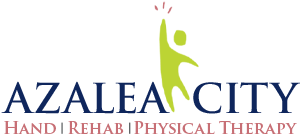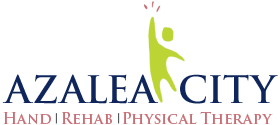Sports Training & Physical Therapy/Occupational Therapy in Mobile AL

When we think about sports training in Mobile AL, images of athletes pushing themselves to the limit often come to mind-strength training, endurance exercises, and skill drills. But what if I told you that physical therapy/occupational therapy is just as important in achieving peak performance and staying injury-free? Whether you're a seasoned athlete or just getting started on your fitness journey, the combination of physical therapy/occupational therapy at Azalea City Hand and Rehab and Physical Therapy and sports training is a game-changer. Let's break down why physical therapy/occupational therapy is not just for rehabilitation but an essential part of any serious training program.
The Role of Physical Therapy/Occupational Therapy in Sports Training in Mobile AL
Most people associate physical therapy/occupational therapy with recovery-after an injury, a surgery, or even chronic pain. But here's the thing: physical therapy/occupational therapy can actually help you avoid injuries before they happen. Physical therapists aren't just experts at getting people back on their feet; they're also highly trained in biomechanics, strength, flexibility, and movement patterns.
Physical therapists use their knowledge to identify areas of weakness or imbalance, correcting these issues before they lead to injury. When integrated into sports training, physical therapy/occupational therapy helps optimize how your body moves, making you stronger, more flexible, and less prone to getting hurt.
But why is this important? Because when you train, you're putting stress on your body. Every movement, sprint, or lift challenges your muscles, joints, and ligaments. Over time, repetitive stress can lead to breakdowns in your body's mechanics-causing injuries that could have been prevented.
Why Injury Prevention Matters In Mobile AL
You may be thinking, "I've been training for years without an injury, so why would I need physical therapy/occupational therapy?" The truth is, many injuries are preventable. When you push your body during sports or training, you're also increasing your risk of injuries like sprains, strains, and overuse conditions like tendonitis.
Preventing injuries is key to maintaining peak performance. Think about it: when you're sidelined by an injury, you're missing out on training time, which affects your progress. Even minor injuries can set you back for weeks, if not longer.
- Improved body mechanics: Physical therapists evaluate your movement patterns to ensure you're performing exercises correctly and efficiently. Small adjustments in how you run, jump, or lift can significantly reduce your risk of injury.
- Muscle balance: Physical therapy/occupational therapy can identify muscle imbalances, where one muscle group is stronger than another. These imbalances can put extra strain on your joints, increasing your risk of injury. A therapist can guide you through exercises to correct these imbalances.
- Flexibility and mobility: Sports training often focuses on strength, but flexibility and mobility are just as important. Physical therapists can prescribe stretches and mobility exercises to keep your joints healthy and improve your overall range of motion.
So, why wait until an injury happens when you can use physical therapy/occupational therapy to prevent it from happening in the first place?
Boosting Performance with Physical Therapy/Occupational Therapy
Beyond injury prevention, physical therapy/occupational therapy can help you reach new levels in your performance. If you've ever hit a plateau in your training or struggled with nagging discomfort that won't go away, physical therapy/occupational therapy might be the missing link.
Here's how physical therapy/occupational therapy complements your sports training:
- Movement efficiency: Physical therapists analyze your body's movement patterns to ensure you're using your muscles and joints as effectively as possible. Whether you're sprinting, swimming, or lifting weights, improved movement efficiency means more power, speed, and endurance.
- Enhanced strength and stability: While traditional sports training focuses on building strength through exercises like squats or deadlifts, physical therapists can help you develop deeper, functional strength that supports your entire body. This often involves targeting smaller stabilizing muscles that are easy to overlook during standard training sessions.
- Faster recovery: Even if you're not injured, physical therapy/occupational therapy can accelerate recovery between training sessions. Techniques like manual therapy, stretching, and modalities like ice or heat can reduce muscle soreness and speed up recovery so you can train harder the next day.
- Improved posture and alignment: Bad posture can throw off your entire game. Whether you're running, swimming, or lifting, your posture and alignment are critical to optimal performance.
Physical therapy/occupational therapy helps identify postural issues and offers exercises to correct them, allowing you to move more efficiently and avoid injury.
Physical therapy/occupational therapy doesn't replace traditional training methods; instead, it enhances them by focusing on aspects of the body that might not be getting enough attention during regular sports conditioning.
Recovering from Injuries: Physical Therapy/Occupational Therapy to the Rescue
Of course, injuries can happen-even when you're doing everything right. And when they do, physical therapy/occupational therapy is your best friend for getting back to your favorite activities quickly and safely.
The beauty of physical therapy/occupational therapy is that it doesn't just focus on healing the injury itself. It looks at the whole body. When you get injured, other parts of your body often compensate for the weakness, leading to imbalances and improper movement patterns. A physical therapist will guide you through a recovery plan that not only heals the injury but also strengthens the muscles around it, ensuring that you come back stronger and less likely to get hurt again.
Here's what you can expect from physical therapy/occupational therapy after an injury:
- Individualized recovery plan: A physical therapist will create a tailored program to meet your specific needs. Whether it's a sprained ankle or a torn ligament, your recovery plan will address your injury and any other areas of weakness or imbalance.
- Strengthening exercises: To prevent future injuries, a physical therapist will help you strengthen the muscles around the injured area. This ensures that the joint is stable and strong enough to handle the physical demands of your sport.
- Gradual return to activity: Physical therapists know that getting back to your sport too quickly can lead to re-injury. They will guide you through a gradual progression, ensuring that your body is ready before you resume full training or competition.
- Pain management techniques: Through hands-on therapy, modalities like ultrasound, or exercises, physical therapy/occupational therapy helps manage pain and inflammation, promoting faster healing.
Why Athletes Should Prioritize Physical Therapy/Occupational Therapy
For athletes, there's no bigger goal than staying in the game, pushing limits, and achieving peak performance. But without proper care, the risks of injury, overtraining, and burnout are all too real. That's why athletes-whether professional or recreational-should prioritize physical therapy/occupational therapy as part of their overall training plan.
Physical therapy/occupational therapy isn't just reactive; it's proactive. By working with a physical therapist, athletes can ensure that they're doing everything possible to stay injury-free, improve performance, and extend their athletic careers.
- Regular assessments: Even if you're feeling great, regular check-ins with a physical therapist can identify potential issues before they become serious. A physical therapist can catch small imbalances, weaknesses, or movement inefficiencies that could lead to bigger problems down the line.
- Injury prevention strategies: Every athlete is different, and your physical therapist can provide you with a personalized plan to minimize your injury risks. From custom stretches to sport-specific strength exercises, your physical therapist will help you develop a plan that keeps you on the field, court, or track.
- Longevity: The reality is that athletes who prioritize physical therapy/occupational therapy often have longer careers. By taking care of their bodies and addressing issues as they arise, they can avoid the wear and tear that takes other athletes out of the game.
What Should You Do if You Want to Incorporate Physical Therapy/Occupational Therapy Into Your Training?
If you're ready to make physical therapy/occupational therapy a key part of your sports training, the first step is simple: schedule an evaluation with a licensed physical therapist. Whether you're currently dealing with an injury or simply want to improve your performance and prevent injuries, a physical therapist will assess your current movement patterns, flexibility, strength, and mobility to create a customized plan that fits your needs.
Here's what you can expect during your first visit:
- Thorough assessment: Your physical therapist will assess how you move, your posture, flexibility, and any areas of weakness. This gives them a clear understanding of where you might be at risk for injury or where performance improvements can be made.
- Goal setting: Whether you want to prevent injuries, recover from one, or simply improve your performance, your therapist will help you set clear goals for your physical therapy/occupational therapy plan.
- Ongoing support: Physical therapy/occupational therapy isn't a one-time thing-it's an ongoing process. Your therapist will work with you to adjust your program as you progress and ensure that you're always on track to meet your goals.
The Winning Combination of Physical Therapy/Occupational Therapy and Sports Training
Physical therapy/occupational therapy and sports training in Mobile AL are like two sides of the same coin. When combined, they create a powerful duo that not only helps athletes recover from injuries but also prevents them in the first place. Whether you're looking to push your performance to the next level or simply stay healthy and strong, integrating physical therapy/occupational therapy into your routine is one of the smartest moves you can make.
Don't wait for an injury to happen-start today, and make physical therapy/occupational therapy at Azalea City Hand and Rehab and Physical Therapy a core part of your training strategy. With the right support, you can train smarter, avoid injuries, and become the best version of yourself on and off the field. Contact us today!
OFFICE HOURS
Monday
8:00am - 5:00pm
Tuesday
8:00am - 5:00pm
Wednesday
8:00am - 5:00pm
Thursday
8:00am - 5:00pm
Friday
8:00am - 12:00pm
Saturday & Sunday
Closed
Azalea City Hand and Rehab and Physical Therapy
316 S Sage Ave Ste C
Mobile, AL 36606


